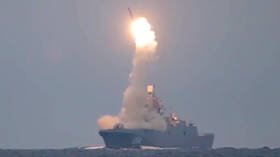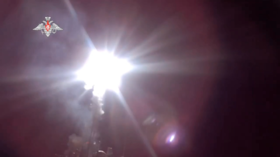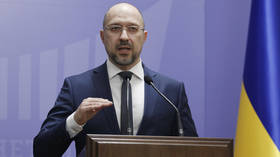Hypersonic missiles incoming, says Russian defense minister

Russia’s new high-tech hypersonic missile, capable of flying through the air at nine times the speed of sound, has finished its testing and will soon begin rolling off assembly lines, the country’s defense minister has announced.
Speaking at a meeting of top military officials on Tuesday, Sergey Shoigu said that trials of the Zircon missile are now finishing up, and that they will begin to be shipped to the military in 2022. He reported that the country would be investing 258 billion rubles ($3.5 billion) into upgrading its arsenal in the coming years.
“By 2026, the number of carriers of high-precision, long-range weapons will grow by 30%, and the supply of cruise missiles of various types will double,” the minister explained. He added that in 2022, there would be 21 launchers equipped with intercontinental missiles placed on combat duty.
The Zircon hypersonic cruise missile is designed to provide superiority at sea and can reach a speed of Mach-9 – nine times the speed of sound, or around 10,000 kilometers per hour. Russian Navy officials have said that the missile will help target enemy aircraft carrier strike groups from long range without being intercepted.
The missile’s speed, combined with a reduced radar cross-section, will theoretically enable it to reach targeted aircraft carriers without a chance for defense or retaliation. It is also meant to be able to intercept enemy supersonic missiles.
In November, officials announced the latest in a series of successful tests of the Zircon, when the Admiral Gorshkov, a warship stationed in the White Sea, successfully struck a naval target at a distance of more than 400 kilometers.
Earlier that month, Russian President Vladimir Putin had announced that the tests were proceeding well and that the weapons would be delivered to the Navy in 2022. “Now, it is especially important to develop and implement the technologies necessary to create new hypersonic weapons systems, high-powered lasers and robotic systems that will be able to effectively counter potential military threats, which means they will further strengthen the security of our country,” he said in televised remarks.
















